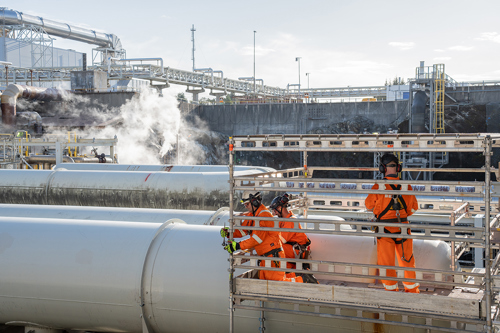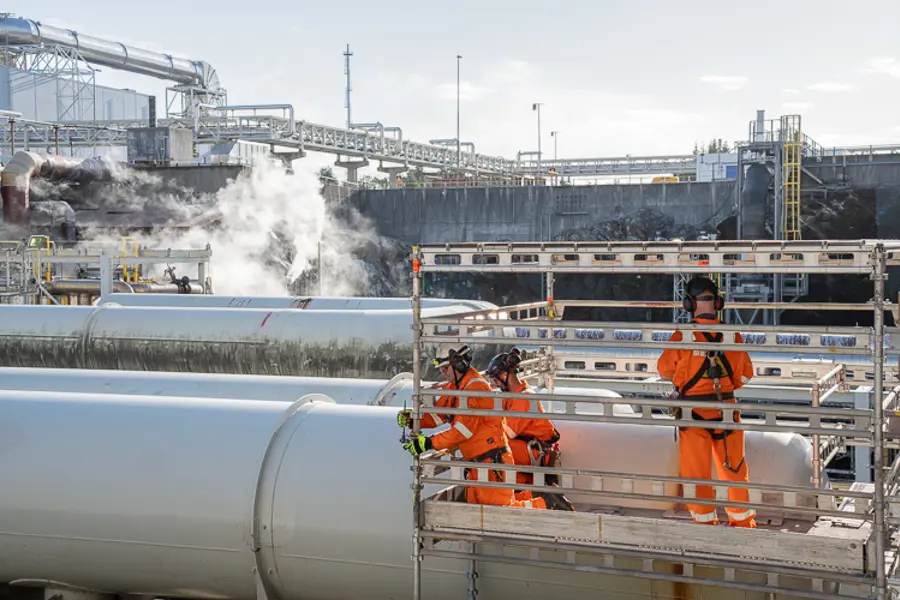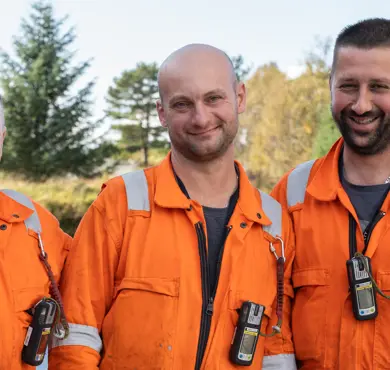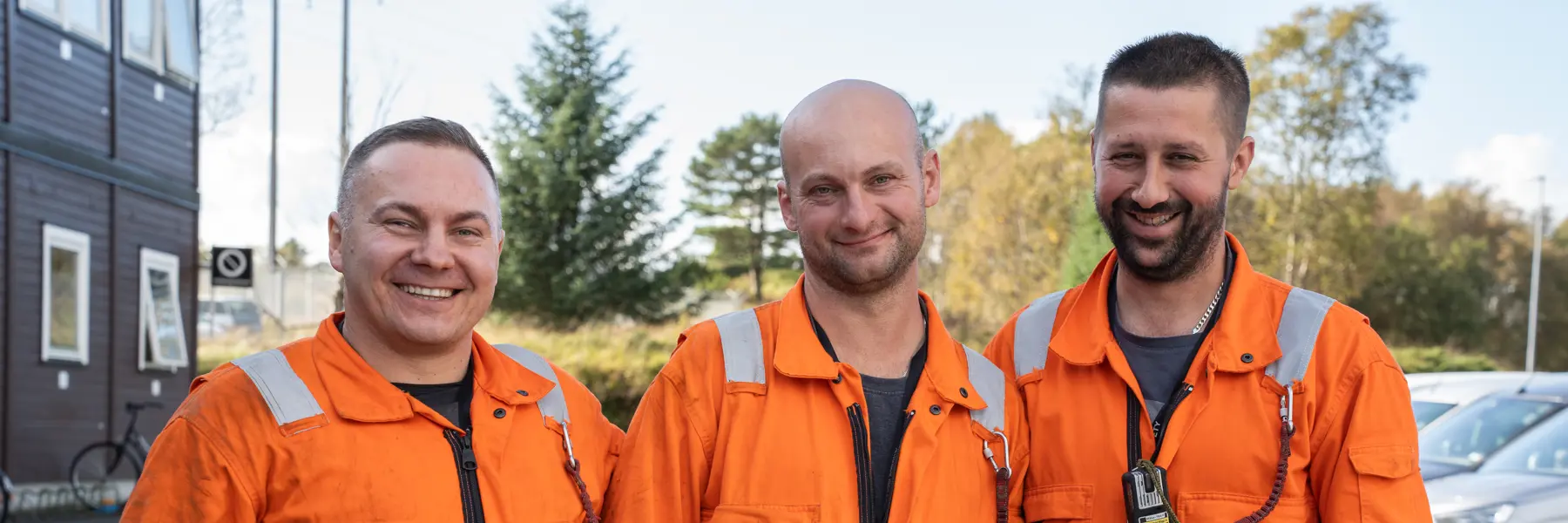Today's mission in the deep cooling water pit at Mongstad has been carefully planned. The scaffolding built here will make it possible to both inspect pipes and carry out pipe replacement if necessary. The scaffolding team is coordinated, works efficiently and there is a good atmosphere at work.
The operators have worked together for almost two years and know each other well. During the break, they talk about career choices, job satisfaction and a friendship that has developed over time.
- Every day has a new challenge and I like that. When I wake up in the morning, I know that I will be working with great colleagues, says Wojciech Bury (38).
- I really enjoy working at height and there is a high safety standard at Mongstad – that´s why I am here, says Jakub Nowakowski (39). He ensures the team gets boxing training after work three days a week.
After several years in scaffolding, three of the four team members have decided get the trade certificate and they are doing it at the same time. The theoretical exam is done. Now the colleagues work diligently to improve their language skills in preparation for the final test. They look forward to having their skills formalized through trade certificates, with the career opportunities and salary adjustments this provides.
Damien Teda (36) is very satisfied with shift work, which gives 14 days at work and 21 days at home.
- Here, no day is the same. I like the job, and the rotation works well for me and the family at home, says Damian Teda.

Great need for skilled workers
There is a great need for skilled scaffolding workers in Norway. SEF reports a shortage of scaffolding workers today and expects the need to increase in the coming years.
- Training qualified scaffolders will become even more important in the future, in line with increasingly new and more complex work tasks in the industry, construction projects and construction industry. Although the industry works actively with recruitment, there are still too few trade certificates in relation to the need, says Eirik Kvittingen, general manager of the Norwegian Education Office for the ISO subjects.
Of the 128 who took trade qualifications in 2021-2022, only 28 were apprentices. The reason is a change in the apprenticeship (LK20) which means that companies working for oil and gas companies can no longer recruit from upper secondary schools due to the age limit of 18 in many projects*. For the recruitment of apprentices for the subject, this is a major challenge, but something that companies can work on.
- In recent years, several companies, such as Beerenberg, have been working purposefully with both recruitment and competence building. This will undoubtedly increase the quality of the skilled workers we train and, in the long term, raise the industry's reputation and thus attract more people to our profession. I encourage all unskilled scaffolders out there to sign up for an exam in vocational theory and start the road to a trade certificate! says Kvittingen.
Investing in competence
For Beerenberg, competence development and trade certificates are an important part of the strategy. Against the background of the lack of access to skilled workers in the industry, the company is investing heavily in practical candidates and has the ambition that they will become skilled and proud skilled workers.
- We work actively with both recruitment and training. Here, we offer both language courses and facilitation for experienced scaffolders who have not yet taken a trade certificate, so that they can take the professional test, says executive vice president for business support Gro Hatleskog in Beerenberg.
In the work to find more routes to trade certificates, the decision on Norwegian training was taken and planned for 2022 with commencement in 2023. Beerenberg has a long-term collaboration with AOF Vestlandet on skills development for employees.
- Here, our goal is that employees with a mother tongue other than Norwegian should be able to formalize their many years of expertise through trade certificates. Language training will prepare them to be able to complete theory courses, exams and professional tests in Norwegian, says Hatleskog.
*After the Vocational Reform, LK20, the scaffolding profession went from an apprenticeship with 2 years at school and then 2 years in a company to a special course arrangement with 1 year at school and 3 years in a company.

Stillaslag Mongstad
Stort behov for faglærte
Det er et stort behov for faglærte stillasarbeidere i Norge. SEF melder om mangel på stillasarbeidere i dag og venter at behovet blir større de neste årene.
– Å utdanne kvalifiserte stillasbyggere blir enda viktigere fremover, i takt med stadig nye og mer komplekse arbeidsoppgaver i industri, bygg og anlegg. Selv om bransjen jobber aktivt med rekruttering, er det fortsatt for få fagbrev i fht. behovet, sier Eirik Kvittingen, daglig leder i Norsk Opplæringskontor for ISO-fagene.
Av de 128 som tok fagbrev i 2021-2022 var det kun 28 lærlinger. Årsaken er en endring i læreløpet (LK20) som medfører at bedrifter rettet mot olje og gass ikke kan rekruttere fra videregående skoler lengre på grunn av aldersgrensen på 18 år i mange prosjekt*. For rekrutteringen av lærlinger til faget er dette en stor utfordring, men noe bedriftene kan jobbe med.
– De siste årene jobber flere bedrifter, som Beerenberg, målrettet med både rekruttering og kompetansebygging. Dette vil utvilsomt øke kvaliteten på fagarbeiderne vi utdanner og på sikt heve bransjens anseelse og dermed lokke flere til faget vårt. Jeg oppfordrer alle ufaglærte stillasbyggere der ute til å melde seg opp til eksamen i yrkesteori og starte veien mot et fagbrev! sier Kvittingen.
Investerer i kompetanse
For Beerenberg er kompetanseutvikling og fagbrev en viktig del av strategien. Med bakgrunn i den manglende tilgangen til fagarbeidere i næringen satser selskapet stort på praksiskandidater og har ambisjon om at de skal bli dyktige og stolte fagarbeidere.
– Vi jobber aktivt med både rekruttering og opplæring. Her tilbyr vi både språkkurs og tilrettelegging for erfarne stillasarbeidere som ennå ikke har tatt fagbrev, slik at de kan ta fagprøven, sier konserndirektør for business support Gro Hatleskog i Beerenberg.
I arbeidet med å finne flere veier til fagbrev, ble beslutningen om norskopplæring tatt og planlagt i 2022 med igangsettelse i 2023. Beerenberg har et langsiktig samarbeid med AOF Vestlandet om kompetansehevning for ansatte.
– Her er målet vårt at medarbeidere med annet morsmål enn norsk skal kunne få formalisert sin mangeårige kompetanse gjennom fagbrev. Språkopplæring vil istandsette dem til å kunne gjennomføre teorikurs, eksamen og fagprøve på norsk, sier Hatleskog.
*Etter Fagfornyelsen, LK20, gikk stillasbyggerfaget fra et læreløp med 2 år på skole og deretter 2 år i bedrift til en særløpsordning med 1 år på skole og 3 år i bedrift.


